- Home
- Paulo Coelho
The Winner Stands Alone Page 2
The Winner Stands Alone Read online
Page 2
How ridiculous! Igor cannot conceal his loathing for those whose decisions affect the lives of millions of honest, hardworking men and women leading dignified lives and glad to have their health, a home, and the love of their family.
How perverse! Just when everything seems to be in order and as families gather round the table to have supper, the phantom of the Superclass appears, selling impossible dreams: luxury, beauty, power. And the family falls apart.
The father works overtime to be able to buy his son the latest sneakers because if his son doesn't have a pair, he'll be ostracized at school. The wife weeps in silence because her friends have designer clothes and she has no money. Their adolescent children, instead of learning the real values of faith and hope, dream only of becoming singers or movie stars. Girls in provincial towns lose any real sense of themselves and start to think of going to the big city, prepared to do anything, absolutely anything, to get a particular piece of jewelry. A world that should be directed toward justice begins instead to focus on material things, which, in six months' time, will be worthless and have to be replaced, and that is how the whole circus ensures that the despicable creatures gathered together in Cannes remain at the top of the heap.
Igor is untouched by this destructive power, for he has one of the most enviable jobs in the world. He continues to earn more money in a day than he could spend in a year, even if he were to indulge in all possible pleasures, legal and illegal. He has no difficulty in finding women, regardless of whether they know how much money he has--he's tested it out on more than one occasion and never failed yet. He has just turned forty, is in good physical shape, and, according to his annual checkup, has no health problems. He has no debts either. He doesn't have to wear a particular designer label, go to a particular restaurant, spend his holidays at a beach where "everyone" goes, or buy a watch just because some successful sportsman is promoting it. He can sign major contracts with a cheap ballpoint pen, wear comfortable, elegant jackets, handmade by a tailor who has a small shop next to his office, and which carry no label at all. He can do as he likes and doesn't have to prove to anyone that he's rich; he has an interesting job and loves what he does.
PERHAPS THAT'S THE PROBLEM: HE still loves what he does. He's sure that this is why the woman who came into the bar some hours earlier is not sitting at his table with him.
He tries to keep thinking, to pass the time. He asks Kristelle for another drink--he knows the waitress's name because an hour ago, when the bar was emptier (people were having supper), he asked for a glass of whisky, and she said that he looked sad and should eat something to cheer himself up. He thanked her for her concern, and was glad that someone should care about his state of mind.
He is perhaps the only one who knows the name of the waitress serving him, the others only want to know the names--and, if possible, the job titles--of the people sitting at the tables and in the armchairs.
He tries to keep thinking, but it's gone three o'clock in the morning, and the beautiful woman and her courteous companion--who, by the way, looks remarkably like him--have not reappeared. Maybe they went straight up to their room where they are now making love, or perhaps they're still drinking champagne on one of the yachts where the parties only begin when the other parties are all coming to an end. Perhaps they're lying in bed, reading magazines, ignoring each other.
Not that it matters. Igor is alone and tired and needs to sleep.
7:22 A.M.
He wakes up at 7:22 A.M., much earlier than his body would like, but he hasn't yet adapted to the time difference between Moscow and Paris. If he was at work, he would already have held two or three meetings with his subordinates and be preparing to have lunch with some new client.
He has another task to fulfill here: he must find someone he can sacrifice in the name of love. He needs a victim, so that Ewa will get his message that very morning.
He has a bath, goes downstairs to have a coffee in an almost deserted restaurant, then sets off along the Boulevard de la Croisette on which nearly all the major luxury hotels are located. There is no traffic because one lane is blocked off and only cars with official permission are being allowed through. The other lane is empty because even the people who live in the city are still only just getting ready to go to work.
He feels no resentment. He has passed the really difficult phase, when he couldn't sleep because he was so filled with pain and hatred. Now he can understand Ewa's feelings: after all, monogamy is a myth that has been rammed down people's throats for far too long. He has read a lot on the subject. The inability to be monogamous isn't just a matter of excess hormones or vanity, but, as all the research indicates, a genetic configuration found in almost all animals.
Paternity tests given to birds, monkeys, and foxes revealed that simply because these species had developed a social relationship very similar to marriage did not necessarily mean that they had been faithful to each other. In seventy percent of cases, their offspring turn out to have been fathered by males other than their partners. Igor remembered something written by David Barash, professor of psychology at the University of Washington in Seattle, in which he said that the only species in nature that doesn't commit adultery and in which there seems to be one hundred percent monogamy is a flatworm, Diplozoon paradoxum. The male and female worms meet as adolescents, and their bodies literally fuse together.
This is why he cannot accuse Ewa of anything; she was merely following her human instincts. However, she had been brought up to believe in those unnatural social conventions and must be feeling guilty, thinking that he doesn't love her anymore and will never forgive her.
He is, in fact, prepared to do anything, even to send messages that will mean he has destroyed someone's world, just so that she'll know that not only is he willing to welcome her back, he will gladly bury the past and ask no questions.
HE SEES A YOUNG WOMAN setting out her wares on the pavement--various bits of craftwork and jewelry of rather dubious taste.
Yes, she will be the sacrifice. She is the message he must send, a message that will be understood as soon as it reaches its destination. Before going over to her, he observes her tenderly; she doesn't know that in a little while, if all goes well, her soul will be wandering the clouds, free forever from an idiotic job that will never take her where her dreams would like her to go.
"How much?" he asks in perfect French.
"Which piece do you want, sir?"
"All of them."
The young woman--who must be twenty at most--smiles.
"This isn't the first time someone has asked to buy everything. The next step is usually: 'Would you like to go for a walk? You're far too pretty to be here selling these things. I'm...'"
"No, I'm not. I don't work in the movies, nor am I going to make you an actress and change your life. I'm not interested in the things you're selling either. I just need to talk, and we can do that right here."
The young woman averts her gaze.
"My parents make these things, and I'm proud of what I do. One day, someone will come along who'll recognize their value. Please, go away. I'm sure you can find someone else to listen to what you have to say."
Igor takes a bundle of notes out of his pocket and puts them gently down beside her.
"Forgive my rudeness. I only said I wasn't interested in buying anything to see if you would lower the price. Anyway, my name is Igor Malev. I flew in from Moscow yesterday, and I'm still a little jetlagged."
"My name's Olivia," says the young woman, pretending to believe his lie.
Without asking her permission, he sits down on the bench beside her. She shifts up an inch or so.
"What do you want to talk about?"
"First, take the money."
Olivia hesitates, then, looking around, realizes that she has no reason to be afraid. Cars are now driving down the one available lane, young people are heading for the beach, and an elderly couple are coming toward them down the pavement. She puts the money in her pocket, not e
ven bothering to count it; she has enough experience of life to know that it's more than enough.
"Thank you for accepting my offer," says the Russian. "You asked me what I want to talk about? Well, nothing very important."
"You must be here for a reason. You need a reason to visit Cannes at this time of year when the city is as unbearable for the people who live here as it is for the tourists."
Igor is looking at the sea. He lights a cigarette.
"Smoking's bad for your health," she says.
He ignores this remark.
"What, for you, is the meaning of life?" he asks.
"Love."
Olivia smiles. This really is an excellent way to start the day, talking about deeper things than the price of each piece of handiwork or the clothes people are wearing.
"And for you?"
"Yes, love too. But for me it was also important to earn enough money to show my parents that I was capable of succeeding. I did that, and now they're proud of me. I met the perfect woman, we married, and I would like to have had children, to honor and fear God. The children, alas, never came."
Olivia doesn't like to ask why. The man, in his forties, continues in his perfect French:
"We thought of adopting a child. Indeed, we spent two or three years thinking about it, but then life began to get too busy what with business trips and parties, meetings and deals."
"When you sat down here to talk, I thought you were just another eccentric millionaire in search of an adventure, but I'm enjoying talking about these things."
"Do you think about the future?"
"Yes, I do, and I think my dreams are much the same as yours. Obviously, I'd like to have children as well..."
She pauses. She doesn't want to hurt the feelings of this unexpected new companion.
"...if, of course, I can. Sometimes, God has other plans."
He appears not to have heard her answer.
"Do only millionaires come to the Festival?"
"Millionaires and people who think they're millionaires or want to become millionaires. While the Festival is on, this part of the city is like a madhouse. Everyone behaves as if they were terribly important, apart from the people who really are important; they're much politer; they don't need to prove anything to anyone. They don't always buy what I have to sell, but at least they smile, make some pleasant remark, and treat me with respect. What are you doing here?"
"God made the world in six days, but what is the world? It's what you or I see. Whenever someone dies, a part of the universe dies too. Everything a person felt, experienced, and saw dies with them, like tears in the rain."
"'Like tears in the rain'...I saw a film once that used that phrase. I can't remember now what it was."
"I didn't come here to cry. I came to send messages to the woman I love, and in order to do that, I need to destroy a few universes or worlds."
Instead of feeling alarmed by this last statement, Olivia laughs. This handsome, well-dressed man, speaking fluent French, doesn't seem like a madman at all. She was fed up with always hearing the same things: you're very pretty, you could be doing better for yourself, how much is this, how much is that, it's awfully expensive, I'll go away and think about it and come back later (which they never do, of course), etc. At least this Russian has a sense of humor.
"Why do you need to destroy the world?"
"So that I can rebuild my own world."
Olivia would like to try and console him, but she's afraid of hearing the famous words: "I think you could give meaning to my life," at which point the conversation would come to an abrupt halt because she has other plans for her future. Besides, it would be absurd on her part to try and teach someone older and more successful how to overcome his difficulties.
One way out would be to learn more about his life. After all, he's paid her--and paid her well--for her time.
"How do you intend to do that?"
"Do you know anything about frogs?"
"Frogs?"
"Yes, various biological studies have shown that if a frog is placed in a container along with water from its own pond, it will remain there, utterly still, while the water is slowly heated up. The frog doesn't react to the gradual increase in temperature, to the changes in its environment, and when the water reaches the boiling point, the frog dies, fat and happy.
"On the other hand, if a frog is thrown into a container full of already boiling water, it will jump straight out again, scalded, but alive!"
Olivia doesn't quite see what this has to do with the destruction of the world. Igor goes on:
"I was like that boiled frog. I didn't notice the changes. I thought everything was fine, that the bad things would just go away, that it was just a matter of time. I was ready to die because I lost the most important thing in my life, but, instead of reacting, I sat there bobbing apathetically about in water that was getting hotter by the minute."
Olivia plucks up the courage to ask:
"What did you lose?"
"The truth is I didn't lose anything. Life sometimes separates people so that they can realize how much they mean to each other. For example, last night, I saw my wife with another man. I know she wants to come back to me, that she still loves me, but she's not brave enough to take the first step. Some boiled frogs still think it's obedience that counts, not ability: those who can, lead, and those with any sense, obey. So where's the truth in all this? It's better to emerge from a situation slightly scalded, but alive and ready to act. And I think you can help me in that task."
Olivia tries to imagine what is going through the mind of the man beside her. How could anyone leave such an interesting person, someone who can talk about things she has never even thought about? Then again, there's no logic to love. Despite her youth, she knows that. Her boyfriend, for example, can be quite brutal and sometimes hits her for no reason, and yet she can't bear to be apart from him even for a day.
WHAT EXACTLY WERE THEY TALKING about? About frogs and about how she could help him. She can't help him, of course, so she'd better change the subject.
"And how do you intend to set about destroying the world?"
Igor points to the one free lane on the Boulevard de la Croisette.
"Let's say that I don't want you to go to a party, but I daren't say so openly. If I wait for the rush hour to begin and stop my car in the middle of the road, within ten minutes, the whole of the Boulevard opposite the beach will have come to a standstill. Drivers will think: 'There must have been an accident' and will wait patiently. In fifteen minutes, the police will arrive with a truck to tow the car away."
"That kind of thing is always happening."
"Ah, yes, but I--very carefully and without anyone noticing--will have got out of my car and scattered nails and other sharp objects on the road in front of it. And I will have carefully painted all of these objects black, so that they blend in with the asphalt. As the tow truck approaches, its tires will be punctured. Now we have two problems, and the tailback of traffic will have reached the suburbs of this small city, the very suburbs where you perhaps live."
"You clearly have a very vivid imagination, but you would still only have managed to delay me by about an hour."
It was Igor's turn to smile.
"Oh, I could come up with all kinds of ways of making the situation worse. When people started gathering round to help, for example, I would throw something like a small smoke bomb under the truck. This would frighten everyone. I would get into my car, feigning despair, and start the engine. At the same time, though, I would empty a bit of lighter fluid on the floor of the car and it would ignite. I would then jump out of the car in time to observe the scene: the car gradually going up in flames, the flames reaching the fuel tank, the explosion that would affect the car behind as well, and so on in a chain reaction. And I could achieve all that with a car, a few nails, a smoke bomb that you can buy in a shop, and a small amount of lighter fluid..."
Igor takes from his pocket a small flask containing so
me kind of liquid.
"...about this much. I should have done that when I realized Ewa was about to leave me, to make her postpone her decision and reflect a little and consider the consequences. When people start to reflect on decisions they're trying to make, they usually change their mind--it requires a lot of courage to take certain steps.
"But I was too proud. I thought it was just a temporary move and that she would soon realize her mistake. I'm sure she regrets leaving me and, as I said, wants to come back. But for that to happen I need to destroy a few worlds."
The expression on his face has changed, and Olivia is no longer amused by the story. She gets up.
"Well, I need to do some work."
"But I paid you to listen to me. I paid enough to cover your whole working day."
She puts her hand in her pocket to give him back the money, but at that moment, she sees the pistol pointing at her face.
"Sit down."
Her first impulse is to run. The elderly couple are still slowly approaching.
"Don't run away," he says, as if he could read her thoughts. "I haven't the slightest intention of firing the gun if you'll just sit down again and hear me out. If you don't try anything and do as I say, then I swear I won't shoot."
A series of options pass rapidly through Olivia's head, the first being to run, zigzagging her way across the street, but she realizes that her legs have gone weak.
"Sit down," the man says again. "I won't shoot if you do as you're told. I promise."

 The Alchemist
The Alchemist Maktub
Maktub Like the Flowing River
Like the Flowing River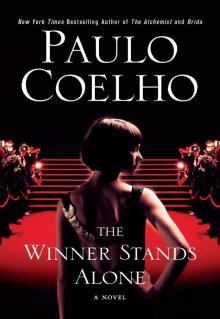 The Winner Stands Alone
The Winner Stands Alone The Spy
The Spy By the River Piedra I Sat Down and Wept: A Novel of Forgiveness
By the River Piedra I Sat Down and Wept: A Novel of Forgiveness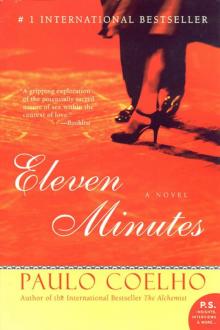 Eleven Minutes
Eleven Minutes Manuscript Found in Accra
Manuscript Found in Accra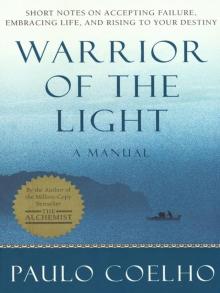 Warrior of the Light
Warrior of the Light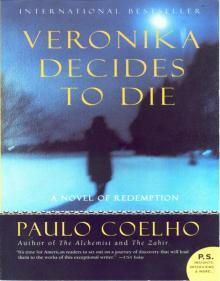 Veronika Decides to Die: A Novel of Redemption
Veronika Decides to Die: A Novel of Redemption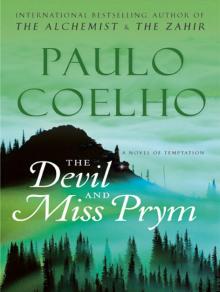 The Devil and Miss Prym: A Novel of Temptation
The Devil and Miss Prym: A Novel of Temptation The Valkyries: An Encounter With Angels
The Valkyries: An Encounter With Angels Brida: A Novel
Brida: A Novel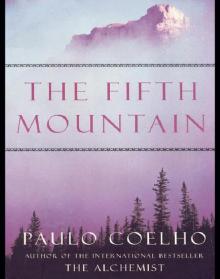 Fifth Mountain: A Novel
Fifth Mountain: A Novel Adultery
Adultery Inspirations
Inspirations The Archer
The Archer The Witch of Portobello
The Witch of Portobello The Pilgrimage
The Pilgrimage The Zahir
The Zahir Brida
Brida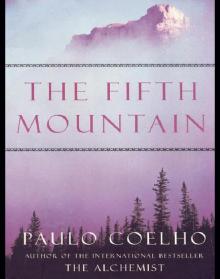 The Fifth Mountain
The Fifth Mountain Like the Flowing River: Thoughts and Reflections
Like the Flowing River: Thoughts and Reflections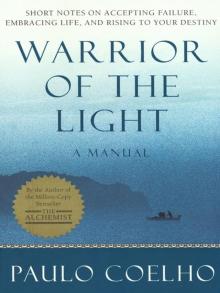 Manual of the Warrior of Light
Manual of the Warrior of Light By The River Piedra I Sat Down & Wept
By The River Piedra I Sat Down & Wept The Supreme Gift
The Supreme Gift Aleph
Aleph Hippie
Hippie Witch of Portobello
Witch of Portobello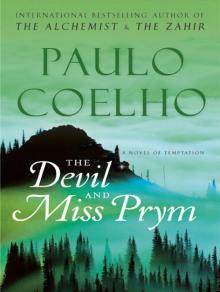 The Devil and Miss Prym
The Devil and Miss Prym The Alchemist - 10th Anniversary Edition
The Alchemist - 10th Anniversary Edition The Valkyries
The Valkyries